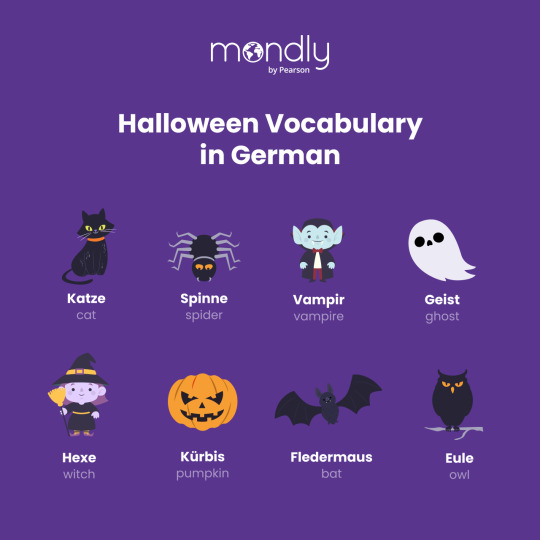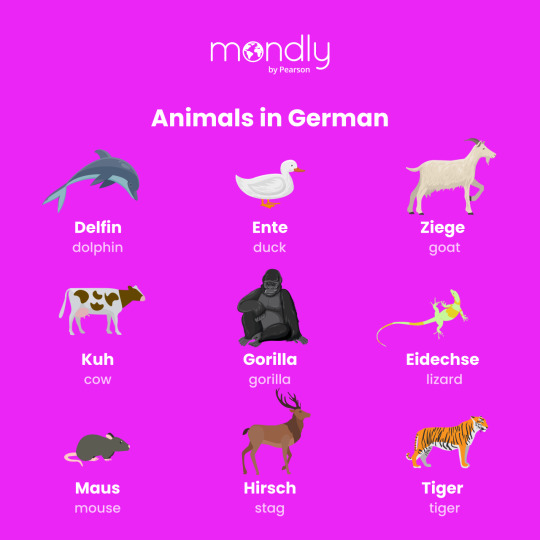#GermanLanguage
Explore tagged Tumblr posts
Text

🎃 One day left! 👻 Get in the spooky spirit with these Halloween words in German. 🧙♀️
#mondly#pearson#halloween#halloween2024#german#learngerman#spooky#spookyseason#germanlesson#germanapp#germanforbeginners#germanlanguage#germanteacher#germanclass#germanlearning#germanonline#germanwords#deutschsprechen#deutschlernen#deutsch
8 notes
·
View notes
Text

It's International Tongue Twister Day, and at IMPRESS Destination Services, we're all about twisting tongues and creating unforgettable experiences! 🗣️🌟
Here's a German tongue twister to challenge your linguistic skills:
"Der dicke Dachdecker deckt dir dein Dach, drum dank dem dicken Dachdecker, dass der dicke Dachdecker dir dein Dach deckt."
Can you say it without stumbling? It's harder than planning a perfect event - and we're experts at that! Remember, whether it's mastering tongue twisters or organizing spectacular events across Germany, practice makes perfect. Let's celebrate the fun of language and the joy of gatherings!
www.impressdestination.com
Tel.: +49 (0)4105 - 770253-0
#TongueTwisterDay#EventPlanning#GermanLanguage#DMClife#germany#mice#destinationmanagement#austria#dmc#eventplanner#incentivetravel#impressdestination#grouptravel#events#Travel#TourismMarketing#DMO#TravelTrends#CulturalTourism#DestinationDevelopment#B2B#Marketing#BusinessStrategy#MICE#Eventplanning#Germany#Austria#DMC#DestinationManagement#Tourism
2 notes
·
View notes
Text
5 In-Demand Job Opportunities in Germany
Engineering (Mechanical, Electrical, Civil): Germany’s engineering industry is world-class, offering exciting roles with top companies. Engineers here are shaping the future of technology and infrastructure.
Information Technology (Software Development, Data Science): Germany is a tech hub, with many opportunities in IT, from software development to AI and data science, driving digital transformation.
Healthcare Professionals (Doctors, Nurses, Specialists): Germany’s healthcare system is advanced and in need of professionals. There’s a strong demand for doctors, nurses, and medical specialists.
Automotive Industry (Electric Vehicles, R&D): Germany is home to the world’s leading car manufacturers, offering cutting-edge roles in electric vehicle development, design, and research.
Renewable Energy (Environmental Engineering, Sustainability): As a leader in renewable energy, Germany offers positions in environmental science and sustainability, perfect for those passionate about green energy.
But there’s a catch: to land these jobs, you need to know German! 🌍
But here’s the hard truth: if you don’t know German, you won’t survive in these roles. In Germany, most professional environments, especially in top industries, require fluent German for communication, paperwork, and collaboration. Without the language, even the best qualifications might not be enough. Knowing German isn’t just a bonus—it’s essential to thrive and advance in your career.
If you're serious about landing one of these jobs, learning German is your first step. And we’ve got the solution for you: #1 German Language Institute in Faridabad and South Delhi. Start learning today and unlock a world of opportunities!
2 notes
·
View notes
Text

🇩🇪 🎓 German themed badges - great for language students, teachers, or school-leavers
#keepcalmandlearngerman#germanteacher#AufWiedersehenClassof2024#classof2024#germanlanguage#badges#schoolleaver#badgemaker#year11#year13#craft#bbloggers#badge#25mm#buttons#handmade#koolbadges#pins#german school#germany#german study#school life
3 notes
·
View notes
Text
1 note
·
View note
Text
Zeit ist Geld, das weiß die Welt 🕐 - "Time is gold, the world knows that."

#deutsch#learngerman#deutschlernen#german#germanlanguage#LearnGermanMemes#passivelanguage#buildvocabulary
0 notes
Text
Top 10 Benefits of Learning German – From Jobs to Travel Opportunities

By 2025, learning a language will be more than a passion project; it will be a skill set crafted for professional growth. Out of all the languages, German is one of the most useful. Benefits of Learning German: Learning German will be a valuable asset whether you want to study abroad, work in Germany, or travel around Europe. Top Talent Link is fully devoted to guiding every learner in India and across the globe to take the first step abroad. Let’s discuss the prospects that come with learning German for you. Read more: https://www.toptalentlink.com/blog/top-10-benefits-of-learning-german-from-jobs-to-travel-opportunities/
0 notes
Text
German Language Institutes in Kerala: Why N-able Training Institute Pvt Ltd Stands Out
If you're looking to learn German in Kerala, choosing the right institute can make all the difference. N-ABLE Training Institute Pvt Ltd, a leading a leading German language institute in Kerala, offers high-quality training tailored to beginners, professionals, and students aiming to study or work in Germany. Known for its experienced faculty, immersive learning environment, and practical language skills development, N-ABLE Training Institute Pvt Ltd has earned a reputation as one of the best places to learn German in the state. Whether you're preparing for German language certification exams like Goethe-Zertifikat or simply want to improve your conversational skills, N-ABLE provides the guidance and resources you need to succeed.

1 note
·
View note
Video
youtube
Kitchen and kitchen utensils in German with subtitles .German made easy! LANGUAGE XXL
https://youtu.be/JyvUbie0gAo
0 notes
Text

🐅 Learn German one animal at a time. ❤️ Start today at the link in bio. 🐭
#mondly#pearson#german#learngerman#germanlesson#germanapp#germanforbeginners#germanlanguage#germanteacher#germanclass#germanlearning#germanonline#germanwords#deutschsprechen#deutschlernen#deutsch
3 notes
·
View notes
Text
Unlock Global Career Opportunities with FLP Worldwide 🌍✨
Looking to study a foreign language or work abroad? 🌏 FLP Worldwide offers top-notch training in German, Japanese, and French, along with career placement in Germany and Japan. Start your international career journey today . 👉 Learn more: https://flpworldwide.com
https://flpworldwide.com/
#LanguageLearning#StudyAbroad#GlobalOpportunities#CareerDevelopment#ForeignLanguages#GermanLanguage#JapaneseLanguage#FrenchLanguage#CareerTraining#WorkAbroad#InternationalCareers#FLPWorldwide#LearnGerman#LearnJapanese#LegalTranslation#JobPlacement#GlobalEducation#AusbildungGermany#NursingJobsGermany
0 notes
Text
The English and German languages

The English and German languages The English and German languages, an article that analyzes the different aspects of the two idioms from a grammatical, syntactical and lexical point of view. This post has been generated with the help of an AI model and subsequently revised. The German language is a dozen fragments of words flung into an octagonal cylinder - take a good look at them before you begin to turn the machine, for you will never see them in their simplicity again - never never any more. Mark Twain Never knew before what eternity was made for. It is to give some of us a chance to learn German. Mark Twain I don't believe there is anything in the whole earth that you can't learn in Berlin except the German language. Mark Twain What are the main relations between the English language and the German language? The English and German languages have certainly a number of important historical and linguistic connections, starting from their common ancestry. As a matter of fact both English and German belong to the West Germanic language branch, which means they share a common ancestral language, Proto-Germanic, that split off from the larger Indo-European language family. That's why many basic vocabulary words in English and German are cognates, meaning they share a common etymological origin. For example, words like "father" (Vater in German), "mother" (Mutter), and "brother" (Bruder) are very similar. The two languages also exhibit some similarities in grammatical structures, such as the use of case, gender, and verb conjugations, although German has retained more of the inflectional complexity of the ancestral Proto-Germanic language. During the Anglo-Saxon period, when the English language was developing, there was some influence and borrowing of lexical items from Old English into the German language. As the languages developed, there was a mutual influence over time, in fact there has been ongoing lexical borrowing and influence in both directions, with German loanwords entering English and vice versa, especially in scientific, philosophical, and technological domains. While not mutually intelligible, speakers of English and German can often recognize cognates and some sentence structures, making it easier for them to learn the other language compared to languages from completely different language families. Overall, the dynamic interplay between English and German has contributed to the continuous evolution and enrichment of both languages, shaping their vocabularies, grammars, and cultural associations in ways that mirror the deep historical connections between the two language communities. So the long-standing mutual influence between English and German has had a significant impact on the development and evolution of both languages over time such as: 1. Lexical borrowing: - English has borrowed many loanwords from German, particularly in fields like philosophy, science, and technology (e.g. "kindergarten", "bratwurst", "zeitgeist"). - Conversely, German has incorporated numerous English loanwords, especially in more modern domains like computing, business, and popular culture (e.g. "computer", "marketing", "online"). 2. Grammatical and syntactical changes: - German's word order and grammatical structures have been influenced by English, particularly in more informal or colloquial usages. - English's comparatively simpler grammar has also influenced the gradual simplification of some German grammatical features over time. 3. Semantic shifts and expansions: - Meanings of cognate words in the two languages have sometimes diverged or expanded in different directions as the languages evolved. - For example, the German word "Handy" now primarily means "mobile phone", while the English "handy" has a broader meaning of being convenient or useful. 4. Phonological adaptations: - Loanwords from each language have often undergone sound changes to fit the phonological patterns of the borrowing language. - This has resulted in adaptations like the anglicization of German words like "kindergarten" or the germanization of English words like "computer" (pronounced as "der Computer" in German). 5. Cultural and societal influences: - The exchange of vocabulary, idioms, and linguistic features reflects the long history of cultural, economic, and political interactions between the English-speaking and German-speaking worlds. - This linguistic cross-pollination has facilitated mutual understanding and integration between the two language communities over time. There are many examples of specific German words that have been adopted into the English language and vice versa? The followings are some prominent examples of German loanwords that have been adopted into the English language, as well as some English loanwords that have made their way into German: German Loanwords in English: 1. Kindergarten - Originally from the German "Kindergarten" meaning "children's garden", this term for an early childhood education institution is now widely used in English. 2. Schadenfreude - This German word refers to the feeling of pleasure derived from another's misfortune. It has become a common term in English. 3. Über - The German prefix meaning "super" or "above" has been adopted in English, as in "uber-successful" or "uber-cool". 4. Leitmotif - This German term for a recurring musical or narrative theme has been adopted into English. 5. Bratwurst - The classic German sausage has made its way into the English vocabulary. 6. Angst - The German word for a feeling of anxiety or apprehension is now used in English. English Loanwords in German: 1. Computer - The English word for a digital device has been adopted into German as "der Computer". 2. Jeans - The classic American style of denim pants is known as "die Jeans" in German. 3. Teenager - The English term for a person between the ages of 13 and 19 is used in German as "der Teenager". 4. Relax - The English verb "to relax" has made its way into German usage. 5. Comeback - The English word for a return to prominence or success is used in German. 6. Smokey - The English adjective "smokey" has been adopted in German, often referring to eye makeup. These are just a few examples demonstrating the extensive cross-pollination of vocabulary between the English and German languages over time. At the same time many other examples of German words that have become part of the English lexicon reflecting the long history of cultural and linguistic exchange between the two languages. Here are some additional examples of German loanwords that have become integrated into the English language: 1. Kindergarten - As mentioned earlier, this term for an early childhood education institution comes directly from the German "Kindergarten". 2. Gesundheit - This German exclamation, meaning "health", is commonly used in English when someone sneezes. 3. Wanderlust - The German word for a strong desire to travel and explore the world has entered the English vocabulary. 4. Zeitgeist - Meaning "the spirit of the times", this German term is used in English to describe the dominant ideas and beliefs of a particular period. 5. Rucksack - The German word for a backpack or knapsack has become part of the English language. 6. Lebensraum - This German term, meaning "living space", was co-opted by the Nazis but has since entered the English lexicon. 7. Doppelgänger - The German word for a look-alike or ghostly double of a person is used in English. 8. Kindergarten - The German-derived institution name has also led to related English words like "kindergartener". 9. Sauerkraut - The fermented cabbage dish retains its original German name in English. 10. Delicatessen - While originally German, this term for a specialty food store is widely used in English. Now here are some examples of the many German loanwords that have become integrated into common English usage, reflecting the lasting cultural and linguistic exchange between the two languages. 1. Brat/Bratwurst - The German sausage has given us the English word "brat" as a colloquial term for a mischievous child. 2. Hamburger - While the modern hamburger sandwich is American, the name comes from the German city of Hamburg. 3. Pretzel - The distinctive knotted bread snack retains its German name "brezel" in English. 4. Wiener/Wienerwurst - The Vienna sausage, or "wiener", has become a common food item in English. 5. Quartz - This common mineral name is derived from the German "Quarz". 6. Umlaut - The diacritic mark used in some German words, like the two dots over a "u", has become part of English grammar terminology. 7. Poltergeist - The German word for a "noisy ghost" has been adopted into English paranormal vocabulary. 8. Ersatz - Meaning an artificial or inferior substitute, this German loanword is used in English. 9. Sauerkraut - The fermented cabbage dish retains its German name in English. 10. Spiel - The German word for a game or performance has made its way into English, often used to describe a persuasive sales pitch. Overall, the infusion of German loanwords has added depth, nuance, and cultural richness to the English language, expanding its expressive capabilities and reflecting the long-standing intellectual and cultural exchange between the English and German-speaking worlds. The influx of German loanwords into the English language has evidently had a significant influence on the evolution and development of English vocabulary in several key ways: 1. Lexical Enrichment: - German loanwords have expanded the overall lexical stock of the English language, providing new terms to describe concepts, objects, and experiences. - Words like "kindergarten", "zeitgeist", and "doppelgänger" have added nuanced and specialized meanings that were previously lacking in English. 2. Semantic Differentiation: - The adoption of German loanwords has allowed English to develop more precise and differentiated terminology. - For example, the German-derived words "angst" and "schadenfreude" provide more specific emotional descriptors than their English equivalents. 3. Cultural Transmission: - German loanwords have facilitated the transfer of cultural ideas and perspectives from the German-speaking world into the English language and broader Anglophone culture. - Concepts like "Weltanschauung" (worldview) and "Gemütlichkeit" (coziness/conviviality) have enriched the English language's ability to express certain cultural constructs. 4. Stylistic Variation: - German loanwords often bring a sense of erudition, technicality, or formality to the English language, providing stylistic options beyond more common Anglo-Saxon vocabulary. - Words like "kindergarten" and "delicatessen" can lend an air of sophistication compared to their simpler English equivalents. 5. Morphological Adaptation: - Many German loanwords have been adapted to conform to English morphological patterns, such as the addition of English suffixes (e.g. "kindergartener"). - This process of linguistic integration has further solidified the presence of these words in the English lexicon. As far as grammar is concerned we can say that there are several key grammatical and syntactical differences that distinguish the English and German languages. These fundamental differences in grammar and syntax reflect the distinct historical development and linguistic typology of the English and German languages, contributing to their unique character and challenges for language learners: 1. Word Order: - German has a more flexible word order, with the verb often appearing at the end of the sentence, especially in subordinate clauses. - English generally follows a strict subject-verb-object (SVO) word order. 2. Noun Cases: - German has four grammatical cases (nominative, accusative, dative, genitive) that affect noun and article declension. - English nouns do not decline for case, with the exception of the possessive 's. 3. Articles: - German has definite (der, die, das) and indefinite (ein, eine) articles that must agree with the noun in gender and case. - English has a simpler article system, with "the" as the definite article and "a/an" as the indefinite article. 4. Noun Gender: - German nouns are assigned one of three grammatical genders: masculine, feminine, or neuter. - English nouns do not have grammatical gender, with the exception of personal pronouns (he/she/it). 5. Verb Conjugation: - German verbs have a more complex conjugation system, with variations for person, number, and tense. - English verb conjugations are generally simpler, with fewer variations. 6. Compound Words: - German allows for the creation of long, compound words by combining multiple nouns or other parts of speech. - English tends to use separate words or hyphenated constructions instead of extensive compounding. 7. Sentence Structure: - German sentences can have a more complex structure, with the main verb often appearing at the end of the sentence in subordinate clauses. - English sentence structure is generally more straightforward, with the verb appearing closer to the subject. The differences in word order and noun cases between German and English have a significant impact on the relative complexity of sentence structure in the two languages. 1. Word Order: - German allows for a more flexible word order, with the verb often appearing at the end of the sentence, especially in subordinate clauses. - This flexible word order enables German to construct sentences with more elaborate and embedded structures compared to the relatively rigid subject-verb-object (SVO) order of English. 2. Noun Cases: - The four grammatical cases in German (nominative, accusative, dative, genitive) affect the declension of nouns, articles, and adjectives. - This case system allows German to convey more nuanced relationships between the different elements of a sentence, such as the subject, direct object, indirect object, and possessor. - In contrast, the lack of a case system in English means that word order and prepositions play a more crucial role in establishing these relationships. The combination of flexible word order and noun cases in German enables the construction of sentences with a higher degree of complexity and subordination, such as: Example German Sentence: "Gestern Abend hat mein Bruder, der ein neues Auto gekauft hat, mir einen Schlüssel dafür gegeben." (Literal translation: "Yesterday evening has my brother, who a new car bought has, me a key for it given.") This German sentence contains multiple embedded clauses and a more intricate arrangement of sentence elements, which would be more difficult to express in a similarly compact form in English. In contrast, an English translation of the same idea would likely require more separate sentences or the use of prepositions and conjunctions to achieve a comparable level of complexity: "Last night, my brother, who had bought a new car, gave me a key for it." Thus, the structural differences between German and English, particularly in terms of word order and noun cases, contribute to the generally greater complexity of German sentence structure compared to the more straightforward syntax of the English language. What are some common challenges German language learners face when translating between German and English sentence structures? German language learners often face several common challenges when translating between German and English sentence structures: 1. Word Order: - Adjusting to the more flexible word order in German, especially the verb-final placement in subordinate clauses, can be difficult for English speakers used to the strict SVO structure. - Correctly positioning the verb in German sentences requires careful attention and practice. 2. Noun Cases: - Understanding and correctly applying the four German noun cases (nominative, accusative, dative, genitive) is a significant hurdle for English learners. - Determining the appropriate case endings for nouns, articles, and adjectives can be challenging, as English lacks this grammatical feature. 3. Sentence Complexity: - German sentences often have a more elaborate and nested structure, with multiple embedded clauses, than their English counterparts. - Accurately translating the logical relationships between these sentence elements can be tricky for learners. 4. Compound Words: - The ability to form long, compound words in German, which may have no direct equivalent in English, requires familiarity with German word formation rules. - Breaking down and accurately translating these compound words can be a challenge. 5. Gendered Nouns: - Remembering the grammatical gender of German nouns and correctly matching articles and adjectives can be a persistent issue for English speakers, who are accustomed to a genderless system. 6. Prepositions and Cases: - Determining the appropriate German preposition to use and how it affects the following noun's case can be a complex task for learners. - Mistakes in this area can lead to inaccurate translations between the two languages. To address these challenges, German language learners often need to develop a strong understanding of the underlying grammatical rules, practice extensively with sentence construction and translation exercises, and continuously reinforce their knowledge through exposure to authentic German texts and conversations. What teaching methods or resources do you recommend for improving German-English translation skills? Here are some effective teaching methods and resources I would recommend for improving German-English translation skills: 1. Immersion and Exposure: - Encourage learners to immerse themselves in authentic German texts, audiovisual materials, and conversations as much as possible. - Exposure to real-world language use helps reinforce grammar, vocabulary, and sentence structure patterns. 2. Contrastive Analysis: - Explicitly compare and contrast the grammatical structures, word order, and syntax of German and English. - Highlight the key differences and have learners practice translating between the two languages to solidify their understanding. 3. Targeted Grammar Instruction: - Provide in-depth lessons on German noun cases, verb conjugations, and other grammatical features that differ significantly from English. - Use plenty of examples and exercises to help learners internalize the rules and apply them correctly. 4. Translation Workshops: - Facilitate group translation activities, where learners work together to translate short passages or sentences from German to English and vice versa. - Encourage discussion, feedback, and error analysis to improve translation skills. 5. Bilingual Text Shadowing: - Have learners listen to or read aloud German text while simultaneously following along with the English translation. - This helps them develop a deeper intuition for the relationship between the two language structures. 6. Online Resources and Tools: - Utilize online dictionaries, translation aids, and language-learning platforms that provide German-English translation practice and feedback. - Examples include Linguee, DeepL, and various language-learning apps. 7. Feedback and Revision: - Provide learners with regular feedback on their translation work, highlighting areas for improvement. - Encourage them to revise their translations based on the feedback, reinforcing the correct application of language principles. Read the full article
#differencesbetweenEnglishandGerman#EnglishandGermanlanguages#EnglishLanguage#Germanlanguage#Indo-Europeanlanguages#lexicalborrowingfromGerman#MarkTwain#OldEnglishandGerman
0 notes
Text
0 notes
Text
German Language Course in Chennai
Our German Language Course in Chennai offers a comprehensive approach to learning, from beginner to advanced levels. With interactive lessons, practical exercises, and personalized feedback, you'll quickly build confidence in speaking, listening, and writing. Learn at your own pace with flexible schedules and expert instructors. Start mastering German Classes at Let’s Speak today and open doors to new opportunities!
1 note
·
View note
Text
Crack the A1 Goethe Exam: With the Tips, Topics & Online Resources for Beginners

If you're going to learn the German language for the very first time and you wish to crack the A1 Goethe Exam, perhaps it's a task, but not an impossible task. If you have a positive mindset, guides, and planning, then you can clear the exam even if you are a beginner. Whether you're a student, IT professional, startup founder, or someone dreaming of a career in Germany, the A1 exam is your stepping stone toward working or studying abroad. It proves your basic understanding of German and is often a visa requirement for Ausbildung programs and job placements. Read more: https://sites.google.com/view/top-talent-link/home
0 notes